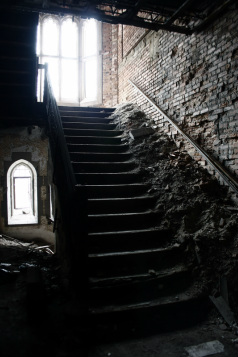I am sometimes asked what makes for a great story. That can be a difficult question to answer because there is no one, single element that makes a story great, it is actually several pieces that all must come together to fit perfectly and in order. In this post, I'll cover what I believe are the crucial and basic pieces that are necessary to build your story and make it great. There are of course, other traits that make stories unforgettable, however due to space and time limitations (is that lunch calling?) I'll limit this writing to the top three pieces I feel are most important.
Like anything that is built, it must first start with a foundation. The basic bare-bones structure if you will. That can mean a simple idea that has crossed your thoughts on more than one occasion, to a detailed journal outlining the plan to your story. I have used both and the two can be very useful in developing the path to where your story is headed. You don’t necessarily have to have the end of your story completed in full detail when you begin to write, however, you probably should have a plan as to where you envision the overall story coming to a climax. Things will undoubtedly change as you write, then re-write and rewrite again, but the overall structure should remain intact, as you continue to lay floors and hang the dry wall.
The next integral part of creating a great story is actually my favorite part of writing and it is the one element that can hinge on whether or not your story succeeds. It is character development. Why is it important? Well, when you think back to your favorite movie and remember the best or most memorable quote from that movie, you always remember who said the line. An unforgettable character or characters is essential in building the plot, but also crucial in grabbing the reader's attention and not letting go. Readers become emotionally attached to characters they can relate to feel compelled to read on until that last and final page is turned. I think of character development as the plumbing and electrical components of a building. Absolutely essential.
The final part really goes along with the foundational element, but on a much deeper level. Conflict and resolution. The yin and yang. The struggle and hope. Without a story having some type of conflict that your character or characters confront and face head on a human level, your story most likely will not be believable and appealing to your audience. People want to know that they are not alone in this daily struggle we call life. By having some type of conflict and possible resolution (if your story calls for it) your reader knows they have a character who is going through something that is difficult, maddening, or scary (what I like) and requires forces greater than their own to overcome these issues. The human level we all live on. That's not to say your story cannot take place if the deepest and darkest of jungles or in the vacuum of outer space. Conflict is conflict no matter where you face it. Yep, time to put on the roof.
...now if someone can help me patch a hole in my wall?
jz
Like anything that is built, it must first start with a foundation. The basic bare-bones structure if you will. That can mean a simple idea that has crossed your thoughts on more than one occasion, to a detailed journal outlining the plan to your story. I have used both and the two can be very useful in developing the path to where your story is headed. You don’t necessarily have to have the end of your story completed in full detail when you begin to write, however, you probably should have a plan as to where you envision the overall story coming to a climax. Things will undoubtedly change as you write, then re-write and rewrite again, but the overall structure should remain intact, as you continue to lay floors and hang the dry wall.
The next integral part of creating a great story is actually my favorite part of writing and it is the one element that can hinge on whether or not your story succeeds. It is character development. Why is it important? Well, when you think back to your favorite movie and remember the best or most memorable quote from that movie, you always remember who said the line. An unforgettable character or characters is essential in building the plot, but also crucial in grabbing the reader's attention and not letting go. Readers become emotionally attached to characters they can relate to feel compelled to read on until that last and final page is turned. I think of character development as the plumbing and electrical components of a building. Absolutely essential.
The final part really goes along with the foundational element, but on a much deeper level. Conflict and resolution. The yin and yang. The struggle and hope. Without a story having some type of conflict that your character or characters confront and face head on a human level, your story most likely will not be believable and appealing to your audience. People want to know that they are not alone in this daily struggle we call life. By having some type of conflict and possible resolution (if your story calls for it) your reader knows they have a character who is going through something that is difficult, maddening, or scary (what I like) and requires forces greater than their own to overcome these issues. The human level we all live on. That's not to say your story cannot take place if the deepest and darkest of jungles or in the vacuum of outer space. Conflict is conflict no matter where you face it. Yep, time to put on the roof.
...now if someone can help me patch a hole in my wall?
jz

 RSS Feed
RSS Feed

